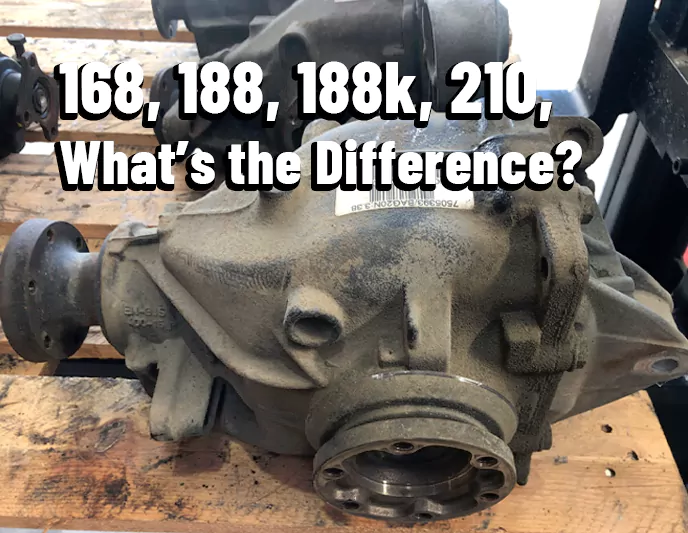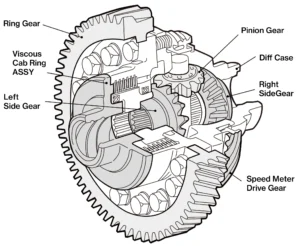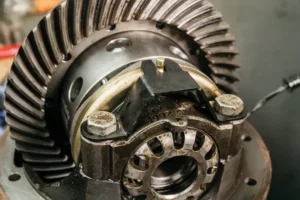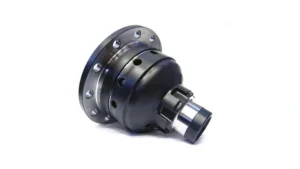The rear axle differential is a critical component of BMW’s drivetrain, responsible for distributing torque between the rear wheels. Over the years, BMW has used multiple rear differential codes—168, 188, 188k, and 210—each with distinct gear sets, torque capacities, housing sizes, and axle configurations. For workshops, and performance shops, understanding these codes is essential when upgrading to mechanical limited-slip differentials (LSDs), such as Torsen units, which enhance traction, cornering stability, and overall axle performance.

BMW Rear Differential Codes and Technical Differences
168 Differential
The 168 rear differential is mostly found in early 3 Series models such as E36 318i/320i and entry-level E46 variants. This differential features a relatively small housing, lighter gear sets, and lower torque capacity, typically around 250–300 Nm. Bearings and flange positions are designed for low to moderate engine outputs. While adequate for stock vehicles, installing a Torsen LSD on a 168 axle significantly improves rear wheel traction and reduces wheel slip under acceleration or cornering.
188 Differential
The 188 is the most common rear differential across E46, E90, and some Z4 models. Its medium-sized housing accommodates stronger gears, handling 300–400 Nm of torque reliably. Standard 188 differentials are used on engines like the 325i/330i, while the reinforced 188k variant supports higher torque engines, such as the turbocharged 335i. Key differences between 188 and 188k include upgraded gear sets, stronger carrier bearings, and slightly reinforced housing flanges. For workshops, the 188 and 188k are ideal candidates for Torsen LSD upgrades because they allow better torque distribution without risking durability.
210 Differential
The 210 rear differential is found in larger BMWs, including 5 Series (E60/E61), 6 Series, and SUVs like X5 and X6. This differential has a larger housing, heavy-duty gears, and high torque capacity, often exceeding 450 Nm. Bearings are larger, and flange offsets are designed to handle high-power engines. Upgrading a 210 rear axle with a Torsen LSD ensures optimal traction and stability, making it suitable for high-performance or track-oriented applications.
Why Stock Differentials Have Limitations?
Most non-M BMW rear differentials are either open or electronically controlled. In low-traction conditions, they may allow one wheel to spin freely while the other remains stationary, limiting effective torque delivery. This is especially noticeable in high-torque or turbocharged models. Workshops and fleet operators often encounter customer complaints about poor traction, uneven tire wear, and instability in corners. Installing a Torsen LSD addresses these issues by redistributing torque dynamically across the rear axle without requiring manual intervention.
Torsen LSD Upgrade Benefits for BMW Axles
- Automatic torque distribution: Torsen differentials transfer torque to the wheel with better grip, improving cornering and acceleration.
- Durability and low maintenance: Gear-based LSDs last longer than friction clutch systems and require less frequent service.
- Smooth operation: Maintains comfort for daily driving while enhancing performance for spirited driving or track use.
Compatibility and Installation Notes
Installing a Torsen LSD requires precise knowledge of the rear axle differential code. Differences in gear ratios, housing dimensions, flange offsets, and bearing arrangements mean that a LSD designed for a 188 axle may not fit a 210 axle. Our Torsen LSDs are specifically engineered to match these codes, ensuring correct fitment, optimal torque distribution, and maximum rear axle performance.
- 168 LSD upgrade: Recommended for light 3 Series models with lower torque; improves traction and reduces wheel spin.
- 188 / 188k LSD upgrade: Suitable for mid-to-high torque 3 Series, E90, and Z4; improves cornering and high-speed stability.
- 210 LSD upgrade: Designed for large sedans and SUVs; supports high-powered engines and ensures rear axle durability under demanding conditions.
Conclusion
Understanding BMW rear axle differential codes—168, 188, 188k, and 210—is essential for workshops, tuning shops, and fleet operators. Each code defines housing size, gear strength, torque capacity, and bearing layout, all of which determine the suitable LSD upgrade. Installing a Torsen LSD tailored to these rear axle codes enhances traction, improves cornering stability, and increases drivetrain reliability.
Ready to upgrade your BMW rear axle? Contact us today to find the right Torsen LSD for your 168, 188, 188k, or 210 differential. Our expert team can provide model-specific solutions, technical support, and installation guidance to ensure optimal performance and durability.



